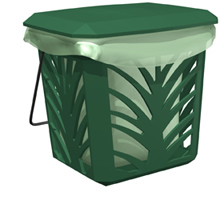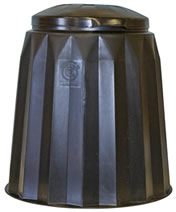Why compost?

Did you know that food scraps and other organics make up around 40% of waste bin (blue-lidded bin) contents? When this organic material breaks down in landfill, it produces methane gas, which has 21 times the warming potential of carbon dioxide (CO2). Landfilling is expensive, requires large areas of land to bury the waste and is not an effective way to manage our resources.
Composting reduces greenhouse gas emissions and diverts thousands of tonnes of compostable material away from landfill every year.
If you don’t have your own composting system at home, you can use your kitchen caddy to collect scraps in the kitchen and then place them into your green organics bin. Alternatively, you can put your food scraps directly into your green organics bin.
What is composting?
Composting is simply a method of speeding up the decomposing, or ‘break down’ of organic materials that occurs in nature. Composting recycles food scraps and turns them into a soil enriching substance called ‘humus’.
Food scraps and other organic material are valuable resources that the council will collect and process into nutrient-rich compost.
References
Composting made easy
How would you like to help save the planet? Composting systems are easy and fun to set up and, better still, are good for the environment. Composting at home, school or even a community garden is a great way to get started.
Below is a PDF containing information about how to set up your own composting system.
Council subsidised compost bins

The Port Adelaide Enfield Council is providing subsidised compost bins to residents.
The 220 litre ‘Gedye’ compost bin can be purchased through Council at a subsidised price of $40.00 (including delivery). The diameter is 700mm and the height is 750mm. Payment can be made at any Council Office. The bin has an open bottom, which must be in direct contact with soil to allow for drainage of liquid and the entry of worms and other organisms.
Composting significantly reduces household waste and is great because it:
- provides a valuable soil improver, mulch and fertiliser for the garden;
- improves drainage of heavy clay soil;
- conserves water in light sandy soil;
- improves soil structure;
- returns nutrients to the soil; and
- increases aeration of soils and encourages the presence of earthworms.

